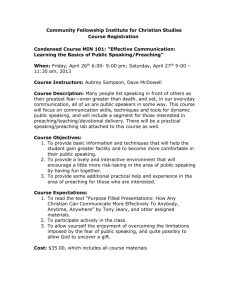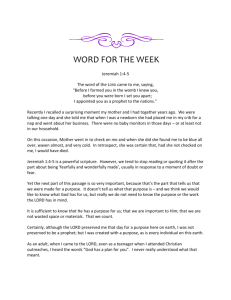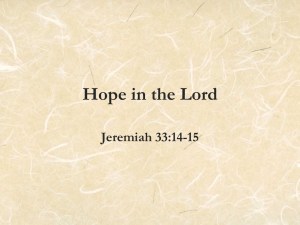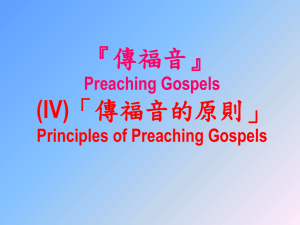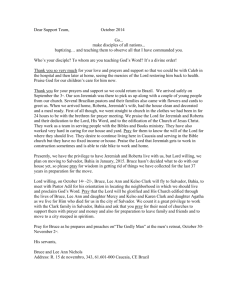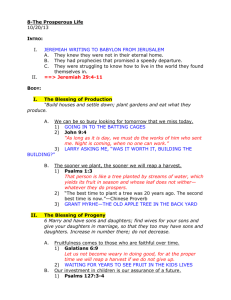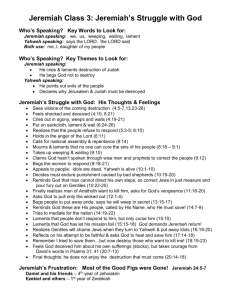Sermon - Giving in Grace
advertisement
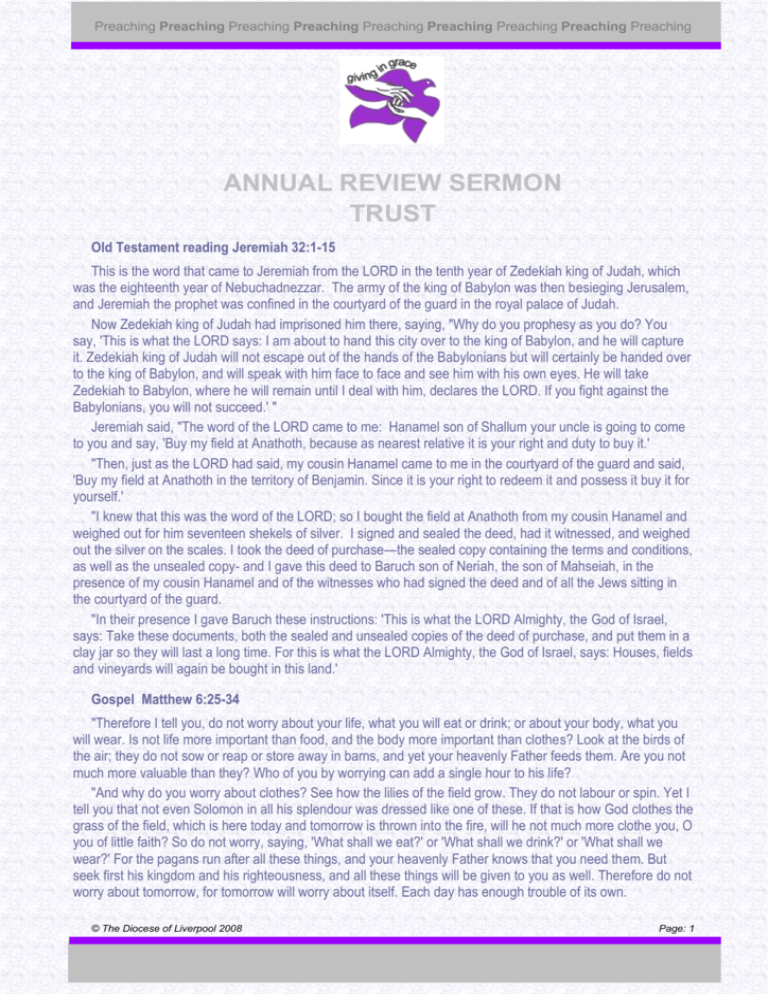
Preaching Preaching Preaching Preaching Preaching Preaching Preaching Preaching Preaching ANNUAL REVIEW SERMON TRUST Old Testament reading Jeremiah 32:1-15 This is the word that came to Jeremiah from the LORD in the tenth year of Zedekiah king of Judah, which was the eighteenth year of Nebuchadnezzar. The army of the king of Babylon was then besieging Jerusalem, and Jeremiah the prophet was confined in the courtyard of the guard in the royal palace of Judah. Now Zedekiah king of Judah had imprisoned him there, saying, "Why do you prophesy as you do? You say, 'This is what the LORD says: I am about to hand this city over to the king of Babylon, and he will capture it. Zedekiah king of Judah will not escape out of the hands of the Babylonians but will certainly be handed over to the king of Babylon, and will speak with him face to face and see him with his own eyes. He will take Zedekiah to Babylon, where he will remain until I deal with him, declares the LORD. If you fight against the Babylonians, you will not succeed.' " Jeremiah said, "The word of the LORD came to me: Hanamel son of Shallum your uncle is going to come to you and say, 'Buy my field at Anathoth, because as nearest relative it is your right and duty to buy it.' "Then, just as the LORD had said, my cousin Hanamel came to me in the courtyard of the guard and said, 'Buy my field at Anathoth in the territory of Benjamin. Since it is your right to redeem it and possess it buy it for yourself.' "I knew that this was the word of the LORD; so I bought the field at Anathoth from my cousin Hanamel and weighed out for him seventeen shekels of silver. I signed and sealed the deed, had it witnessed, and weighed out the silver on the scales. I took the deed of purchase—the sealed copy containing the terms and conditions, as well as the unsealed copy- and I gave this deed to Baruch son of Neriah, the son of Mahseiah, in the presence of my cousin Hanamel and of the witnesses who had signed the deed and of all the Jews sitting in the courtyard of the guard. "In their presence I gave Baruch these instructions: 'This is what the LORD Almighty, the God of Israel, says: Take these documents, both the sealed and unsealed copies of the deed of purchase, and put them in a clay jar so they will last a long time. For this is what the LORD Almighty, the God of Israel, says: Houses, fields and vineyards will again be bought in this land.' Gospel Matthew 6:25-34 "Therefore I tell you, do not worry about your life, what you will eat or drink; or about your body, what you will wear. Is not life more important than food, and the body more important than clothes? Look at the birds of the air; they do not sow or reap or store away in barns, and yet your heavenly Father feeds them. Are you not much more valuable than they? Who of you by worrying can add a single hour to his life? "And why do you worry about clothes? See how the lilies of the field grow. They do not labour or spin. Yet I tell you that not even Solomon in all his splendour was dressed like one of these. If that is how God clothes the grass of the field, which is here today and tomorrow is thrown into the fire, will he not much more clothe you, O you of little faith? So do not worry, saying, 'What shall we eat?' or 'What shall we drink?' or 'What shall we wear?' For the pagans run after all these things, and your heavenly Father knows that you need them. But seek first his kingdom and his righteousness, and all these things will be given to you as well. Therefore do not worry about tomorrow, for tomorrow will worry about itself. Each day has enough trouble of its own. © The Diocese of Liverpool 2008 Page: 1 Preaching - Annual Review - Trust Sermon Trust is a very contentious issue at present. The old “trust me I’m a Doctor…a lawyer…etc” has gone now. In the news there are frequent stories about the lack of trust people now have in institutions such as government, pensions, banks, and the BBC. Where can we put our trust; who can we put our trust in? The answer as to who for Christians, is God! But the problem is, for Christians, sometimes this mysterious God calls us to do things which at times seem rather bizarre - such as our Old Testament reading in which Jeremiah is called by the Lord to buy a field. Why was property investment such a bizarre thing for Jeremiah to do? The city of Jerusalem had been under siege for a year and Jeremiah had already prophesied that the Babylonians would succeed and the King would be taken prisoner. Jeremiah had been imprisoned for this very unpopular prophesy. So whilst in prison Jeremiah was buying land occupied by the Babylonians; land which would not return to the Israelites for 70 years. Now that’s a long tem investment - that’s an act of trust! Jeremiah was called by God to enact the prophesy by demonstrating publicly his trust and confidence in God to restore the land to Israel following its capture and the exile of the Israelites. Jeremiah would be taken to Egypt. It is difficult to contemporise this action for the bonds of kinship and spiritual significance of land is difficult to translate into our culture. The Israelites had no concept of an afterlife. Therefore land, inheritance and descendents were the demonstration of God’s blessings, pleasure and providence. Righteousness leads to material blessings not spiritual promises. That’s why Jesus’ teaching “blessed are the poor, blessed are the meek”, was so revolutionary in its time. The nearest analogy is perhaps the withdrawal of your pension to invest in the purchase of something you will never use, and never see, and which will not pay you interest or dividends - a mile of an Antarctic glacier; helpful for penguins but not as an investment or substitute for a pension! Jeremiah put his trust in God materially as well as spiritually. He was a poor man, imprisoned for speaking out and yet he obeyed the Lord and put his money where his mouth was - just as he had been told to do. What an incredible witness that must have been to other people. A man who not only said there would be restoration after exile but who believed in it so much that he would buy occupied land. It appears easier for us to segregate our lives into the spiritual issues that we have to trust God for and the material issues that we control. This may be because we feel we cannot control the future for those we love and care for in their healing, safety, wellbeing - we have to trust in God. We cannot control the security of our family in the future. But such compartmentalisation is neither biblical nor appropriate. God is God of both spiritual and material. Our God created heaven and earth, and is sovereign over all. God uses material things for divine purposes such as bread and wine to feed us with the body and blood of Christ. Water for baptism as the sign and seal of new birth in Christ; to wash us through the Holy Spirit, and cloth us in Christ. The ultimate proof that God is God of material as well as spiritual matters is the incarnation of Jesus Christ; God made man. If we want to worship this wonderful God, God of heaven and earth, God of material and the spiritual then that will involve trust. To worship means to give worth, to give thanks and praise, to glorify and enjoy, to trust and obey. To do this means that we have to trust God in material things as well as spiritual. You may well do this in small ways - such as saying grace at mealtimes; giving thanks to God to enable you to have food on the table. Although saying Grace may become © The Diocese of Liverpool 2008 Page: 2 Preaching - Annual Review - Trust habitual over time its purpose is both to thank God and to remind us of our dependence on God, and our thanksgiving for God’s provision for us. It marks us as a Christian as we distinctively show our thanksgiving and acknowledgment of our dependence on God. The offertory in our worship is a similar action. It is a symbol of our dependence on God, an act of thanksgiving for God’s provision for us in our pension, benefits, salary or pocket money. The offertory is a reminder that everything we enjoy, everything we have, every penny we possess is Gods. What we do when we put our cash on the plate, our money in our envelope, or our standing order through the bank is test our faith and trust in God! So how far did you test your faith and trust in God today? Did you even think about it? How do you decide what to put in your envelope, in your charitable giving, in your standing orders? Would another person looking through your bank statements or your purse, or your budget see any distinctiveness, or any difference in how you spend your money compared to someone who doesn’t worship God? Fringe This doesn’t happen over night. At first we may not even recognise that the offertory in church is any more than a collection - to pay the gas bill, or the minister perhaps? But it isn’t, it’s an offertory. Its purpose is to enable us to grow in our reflection of God’s generosity and to plan what we want to trust God with in order to care for God’s church, and share with God’s world. If you don’t have envelopes or a standing order, then take the first step. Plan your giving, and think and pray how much each week, month or year, you want to be associated with God and spend some of your money on God’s work in this church. Congregation and core I don’t know if you say Grace at meals, but if you don’t why not start and at every mealtime remind yourself about God and God’s generosity before you eat. If you do then think about how you started that, it may have felt strange at first but soon you got used to it, and it’s difficult to think of eating the meal before thanking God. Trusting God with your income is the same. Putting God first before you use your money! The easiest way for those with bank accounts, is to think and pray about what percentage or proportion of your income, benefit or pension, that you are prepared and even excited to trust God with first - before anything else. Would you trust God with 1% - £1 of each £100? Would you trust God with 5% - £5 of each £100? Trust God that you will have sufficient for your needs in what you are left with - be it 99%, 95%, or as many people do the biblical tithe which leaves you 90% of the income. It’s a big step giving proportionately. If you have never thought about your giving that way then the first step might be to see what proportion is given now - it can be surprising to see how much or how little you give now. £5 can seem so much until you compare it with all you don’t give. A real blessing about giving first and in proportion to what we receive is that those who have less give less. This is not a church with a subscription which asks everyone to give the same. We ask all to give of what they have, not what they have not got. Just try and trust God, to give first as an act of thanksgiving and as an act of faith, trust and worship. If Jeremiah could do this without the benefit of Jesus’ teaching, surely we can do it! We know that worshipping God is not a short cut to either prosperity or fertility as the Old Testament seems to imply, but that God will never let us down! Core For those of us in leadership positions there is no excuse, we ought to be leading our expenditure with God’s work, by giving a good proportion to our church, our mission and charities © The Diocese of Liverpool 2008 Page: 3 Preaching - Annual Review - Trust that God has placed on our heart. We cannot ask others to follow where we fear to tread. The glory of God is made visible as we trust in God and by showing this trust in material matters through our faithfulness help God’s kingdom values break through into God’s world. There are three questions for us as leaders: 1. What has God entrusted to us; spiritually and materially? 2. In the light of what God has entrusted us with, what are we doing with it? 3. Who and what benefits from our priorities? For our giving is not simply a test of trust and faithfulness, it is to enable God’s Will to be done. We pray it often enough, “thy will be done on earth as it is in heaven”. Are we prepared to help make it happen? I believe that if we are - in trust and in faith then we too will eventually be able to say as our gospel does, “we do not worry about tomorrow, for tomorrow will worry about itself”. Our heavenly Father knows what we need so we seek first his kingdom and his righteousness, and trust that all we need will be given to us as well.” Amen © The Diocese of Liverpool 2008 Page: 4
